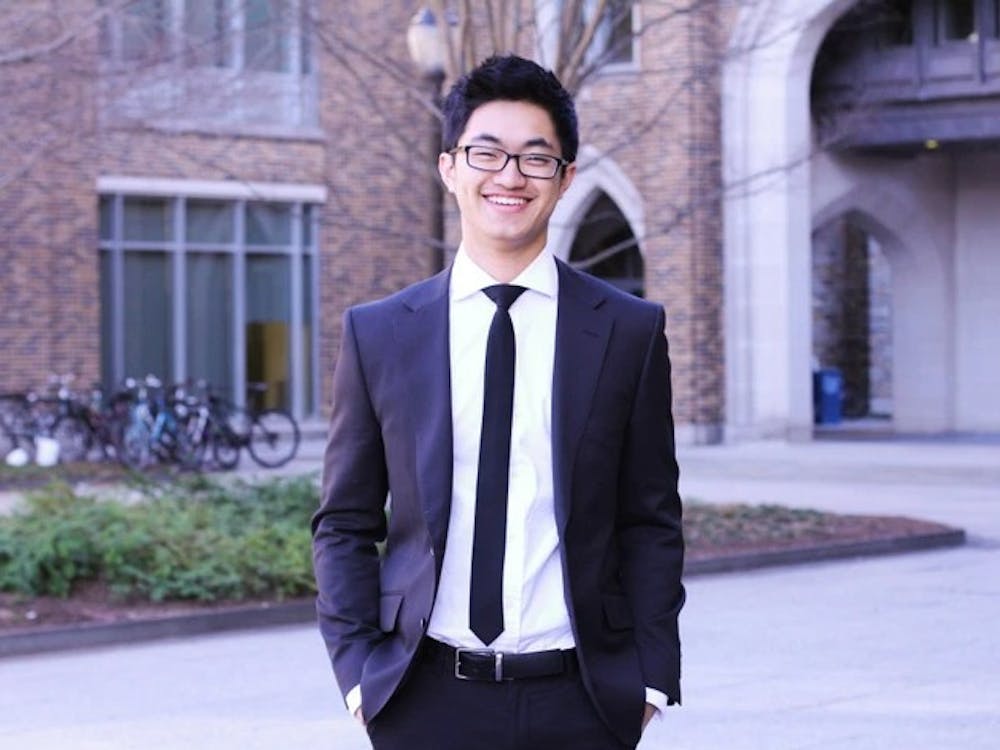Michael Tan is a Trinity senior majoring in economics and statistics with a certificate in philosophy, politics and economics. As a participant in the bSchool (Book School) program of the Creator Institute, Tan wrote and will publish a novel, "The Death of Uncertainty," under the mentorship of Professor Eric Koester at Georgetown University. The novel explores themes of free will and adversity in a society where an artificial intelligence algorithm enables people to make the optimal decision in every situation. This interview has been edited for length and clarity.
The Chronicle: Works like "Brave New World" and "1984" present dystopian visions of humankind dominated by technocratic power, but your book explores AI as a technology that significantly improves people’s lives. Does your book have an optimistic outlook?
Michael Tan: My book is more akin to "Brave New World." The society is generally happy—people are living good lives. While humans make many mistakes, and our brains are not perfect, I think there is the potential for a perfect engine of decision making, such as an AI algorithm. What if I had an algorithm that could tell me the best thing to do? Hypothetically, if we could know the perfect decision for every choice we faced, that would be an interesting society to explore. Still, I wouldn’t say my book is more optimistic—it’s a balanced assessment of the benefits and disadvantages of such a society.
TC: Achieving perfection is an important theme in your book, but perfection is a complicated idea. How does your book address the subjective nature of perfection?
MT: The book explores perfection as a highly personalized system built around your needs and preferences. For example, the main character gets woken up at 6:20 every day, based on all kinds of data points and analysis of his genetic makeup. When he goes out to eat, the AI knows what’s the best item on the menu for his individual tastes. But even if we achieve something that works for every person, the book asks what potential issues there would still be with such a society.
Then, the main character has an interaction outside of the algorithm. He discovers that there are certain experiences he can’t access within his society, where he does have freedom of choice; but, he never thought much about free will, he just followed the algorithm’s recommendations.
TC: What motivated you to join the Book School program and write a novel as a full-time student?
MT: I think I’ve always been a writer. I’m active on platforms like Quora and Medium, and I had my own blog for a while. One day, I was having dinner with a friend at West Union and we started talking about the issues that are in my book—artificial intelligence, free will and optimality—and I had so many questions in my mind. Right after that conversation, Professor Koester [at Georgetown University] reached out to me. One of my best friends, who attends Georgetown, wrote a book through [Koester’s] program, and I helped her fundraise and edit a few chapters. It turned out she had recommended me to Koester. It was a perfect storm of things coming together. Ultimately, writing the book was just something really cool to do with my life, and I had a lot of people who supported me to do it.
TC: As you finish college, what insights would you give to younger students about how to have a well-rounded intellectual experience in college?
MT: College is a special time because you have the freedom and safety net to do a lot of different things. Personally, I try to separate my college experience and my professional career as much as possible because I know there are things that I won’t be able to do later. I wouldn’t be able to write a book while working a full-time job. So, I try to pursue things that stimulate me intellectually and think about the opportunity cost of not pursuing them. I took courses that interest me, I tented in K-Ville, I got to see plays at DPAC. I didn’t want to spend the special time I have here—that I can’t get back—on things that I may do anyway in my professional life.
Get The Chronicle straight to your inbox
Sign up for our weekly newsletter. Cancel at any time.

